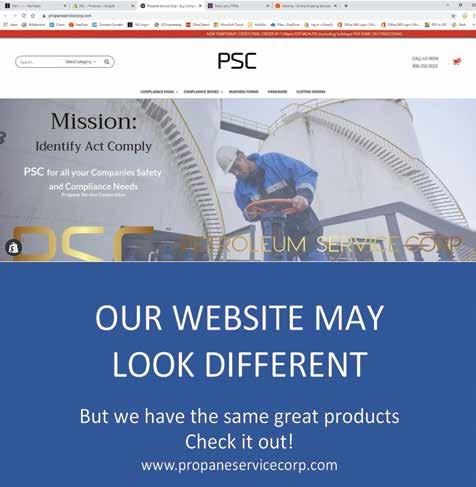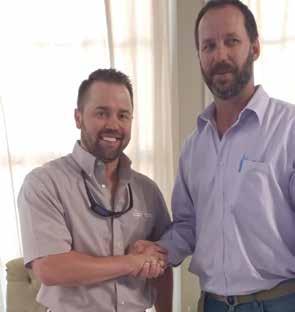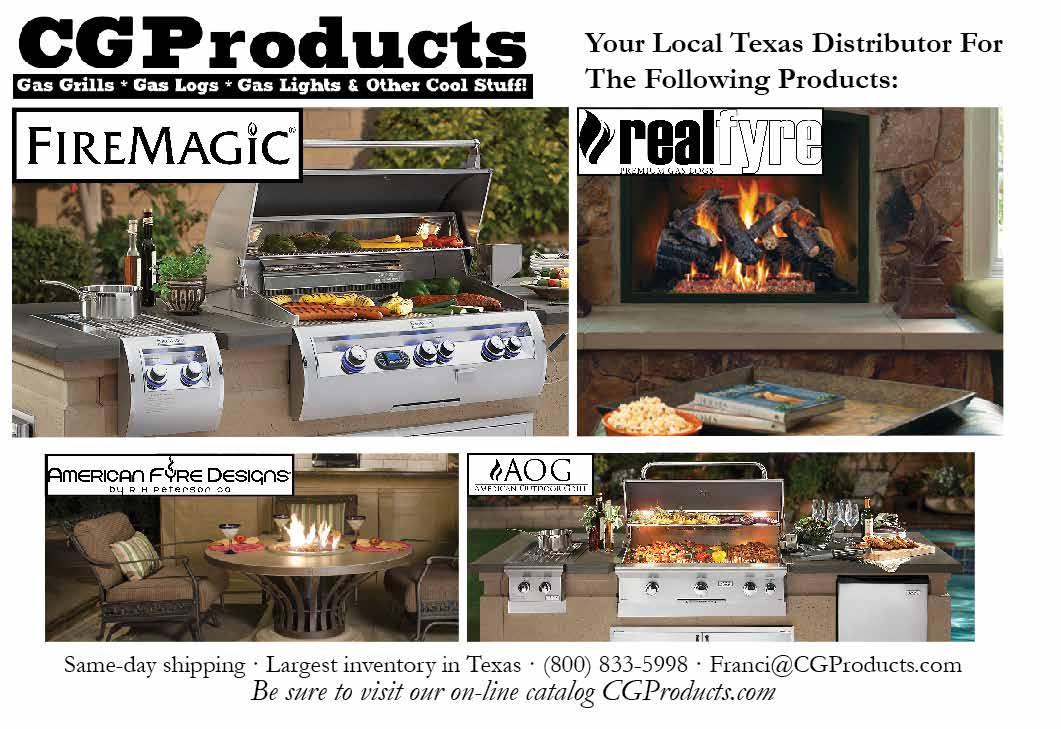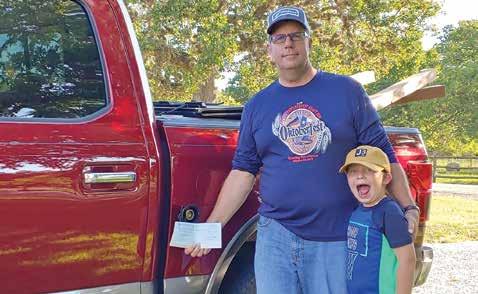
8 minute read
Walking the Walk: Texas Propane Marketers Converts Entire Fleet to Propane Autogas
Walking the Walk: Texas Propane Marketer Converts Entire Fleet to Propane Autogas
Green’s Blue Flame Gas Company is leading by example in the propane industry. In October of 2019, the company finished converting the last of its service and delivery vehicle fleet to operate using propane autogas. This now means that their entire fleet, 100% of their applicable
Advertisement

vehicles, are propane equipped. Green’s Blue Flame, one of the first partners of Alliance AutoGas (AAG) in 2010, has been under continuous ownership and operation by the Green family who started the business in 1967.
President of Green’s Blue Flame Gas Company, Joe Green says, “I met Randy Doyle [former CFO] of Blossman Gas [founding company of AAG] back in 2009 through [NPGA] benchmarking. Randy told me about AAG and asked if I was interested. After I said I was, Stuart Weidie called me and I soon found out that we had a lot of common interests. We wanted to run everything we could on propane and make propane more accessible to our customers, and I knew AAG could contribute to that goal.” When speaking upon the impact Green’s Blue Flame has made on the propane industry, Stuart Weidie, President of AAG added, “Joe and Brian Green have been leaders in the US autogas industry for many years. We are honored that they are a major contributor to the AAG network and have set a fine example by deploying autogas in their own fleet.”
Since Bill Green started Green’s Blue Flame Gas Company back in the 1960s, the family business has always utilized propane in whatever way possible. Brian Green, business development manager for Green’s Blue Flame says, “The technology has changed significantly over the years but the constant for our company has been the mentality of doing what is necessary to convert our vehicles and keep them running on propane.”
Shawn Hicks, service manager for Green’s Blue Flame, has been with the company for almost 40 years and has contributed largely to the success of their autogas program. “Having someone inhouse that has the ability to diagnose and repair anything propane related has been key in enabling the company to achieve a 100% propane fleet, not including our propane transport,” says Green.
When speaking upon the family’s business, Brian Green says, “The propane industry is working in the background to make sure homes and other essential businesses continue to operate during this difficult time. As a primarily commercialfocused propane service provider, we have many customers critical to the supply chain needed to support households and
essential infrastructure. The most notable is a local food bank that distributes food to those that need it.”
Garrett Green, operations manager for Green’s Blue Flame states, “We made changes to our delivery and invoicing process to provide the safest environment possible for our employees and customers while maintaining a quality service.”
This past year, Green’s Blue Flame was able to secure about $65,000 through the Texas Emissions Reduction Plan (TERP) to convert their fleet to the domestic fuel. The TERP program provides financial incentives to eligible individuals, businesses, or local governments to reduce emissions from polluting vehicles and equipment. “Our state is fortunate to have a program like TERP, which provides incentives to fleets who want to utilize a clean-burning fuel such as propane,” says Brian Green.
Green’s Blue Flame has 18 total vehicles in their service and delivery fleet, ranging from bobtail trucks to light-duty service trucks. Fuel savings are adding up quickly; the company is currently saving 60% by
MEMBER Disability Insurance • Farm & Ranch • Employee Benefits • Long Term Care Financial & Estate Planning • Home & Auto • Life Insurance using propane in their bobtail trucks as opposed to diesel and saving 50% by utilizing propane in their light-duty vehicles. Green’s Blue Flame is also pleased to see savings on their overall vehicle maintenance. For example, regulations require diesel-powered vehicles to use diesel emissions fluid (DEF) for daily operation to help reduce particulate matter and nitrogen oxide (NOx). Propane autogas burns clean and does not require additional fluids like DEF, which eliminates the expense entirely.
Is the missing piece worth THE RISK
Other propane owners have come to our agency to get help with connecting their insurance pieces:
1) Some have grown frustrated with the lack of timely response and personal service from their current agent. 2) Many have discovered a missing piece of coverage after meeting with us.
3) Most tell us they have no idea what companies insure their industry and are surprised to learn there are multiple options available. Josh McAdams
McAdams Propane Co.
Midstream Transportation Co. “I cannot say enough about Rusty and his team at Marshall Young Insurance. Not only are their prices highly competitive and comprehensive, but their customer service is outstanding as well. Marshall Young’s team goes above and beyond to exceed our insurance needs.”


WWW.MARSHALLYOUNG.COM
Preventing Rear-End Collisions
Over 25 % of all auto accidents are caused by rear-end collision. And within Crum & Forster’s auto claims, they are the #1 claim in terms of severity. As a trained driver, it is imperative for you to know the techniques necessary to avoid a rear-end collision:
Maintaining a Safe Following Distance
Always maintain a safe following distance between your vehicle and the vehicle in front of you, and adjust that distance depending on your speed, the type of vehicle driven, weight of vehicle, cargo being transported, road conditions, your alertness level and weather conditions. In general, industry standards below are guidelines to consider in ideal road and weather conditions at 40 mph or less: • Personal Passenger Vehicles: Minimum of 3 seconds • Medium to Heavy Size Trucks: Minimum of 4 seconds • Semi tractors & Trailers: Minimum of 6 seconds
Increase your distance above 40 mph and add additional time for adverse weather and road conditions and when driving at night.
Avoiding Distractions
One of the major causes of rear-end accidents is distractions. Below are just a few ways to avoid the most common distractions: • Stay off the phone • If something drops on the floor of vehicle, leave it until stopped at a safe location. • Adjust GPS/Telematics before driving. • Do not read while driving.
Defensive Driving Methods to Prevent Rear-End Accidents
Watch Out for Others. Focus on your own driving, but be aware of other drivers who may be distracted or impaired.
Check Mirrors Regularly. Check your mirrors every 3 to 5 seconds. This helps avoid complacency and tunnel vision.
Be Cautious of Vehicle in Front of
You. Never assume that a vehicle that begins to enter an intersection will not pull away and then stop suddenly.
Scan Road Ahead. Scan the road ahead of you for brake lights, changing traffic lights, pedestrians or other hazards. Also, be aware of vehicles beside and behind you.
Extreme Conditions. When you encounter extreme weather conditions, find a safe place to park and wait for conditions to improve.
Don’t Drive Too Fast. Always follow speed limits, and slow down further when conditions are hazardous.
Watch for Poor Traction. Be aware of areas where traction may be reduced due
Autogas Dispensing High Differential Pressure Autogas Dispensers NFPARules Change Future ofAutogas Refueling
ZVG2-T EURO Nozzle with Scuff Guard Nozzle Talker
EURO Nozzles &Adapters
16.0320
GasGuard Holster-Mod Flush Mount Lockable Holster (Nozzle not included.)
Atlanta GA (800) 241 -41 55
Chandler OK (800) 763-0953
Dallas TX Fayetteville NC
(800) 821 -1 829 (800) 447-1 625
Houston TX (800) 334-781 6
Little Rock AR (800) 643-8222
Indianapolis IN (800) 241 -1 971
Kansas City MO (800) 821 -5062
Orlando FL (800) 821 -0631
Richmond VA (800) 368-401 3
St. Louis MO
(800) 423-4685
16.0331
16.0363
to snow, ice, gravel or oil.
Don’t Rush to a Stop Sign. Begin applying breaks gradually and early when approaching a stop sign or red traffic signal.
Stopping Space at Intersections.
When approaching an intersection, keep your eyes on the vehicle in front of you. Be sure that you can stop safely if the driver chooses to stop suddenly.
Pre-trip Inspection. Conduct a pretrip inspection to ensure that all head lights, brake lights and signals are functioning correctly, brakes are adequately adjusted, and mirrors are positioned correctly.
Avoid Stopping Too Close. Avoid stopping too close to the vehicle in front of you at an intersection. Make certain that you can see the rear tires below the bumper of the vehicle in front of you.
Leaving Intersections. Wait 3 seconds for the vehicle in front of you to move before accelerating.
Avoid Sudden Braking. Always remember to avoid sudden braking as it can easily cause you to lose control of your vehicle.
Tailgaters. If you encounter a vehicle following you too closely, simply slow your vehicle gradually to a safe spot on the road to allow them to pass.
Plan Your Trip. When possible, preplan your trip to avoid heavy traffic or adverse weather conditions. This article is courtesy of information compiled by Crum & Forster. This material is provided for information purposes only and is not intended to be a representation of coverage that may exist in any particular situation under a policy issued by one of the companies within Crum & Forster
Let the company that knows your business, protect your business
worker’s compensation • general liability • auto insurance property insurance • health insurance & employee benefits risk management services
Protecting Propane and Petroleum Dealers for over 20 Years!
Member
225 S. Fifth St., Waco, TX 76701 • (800) 267-6221 • www.insurors.com




